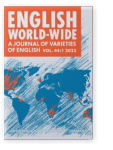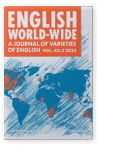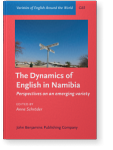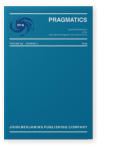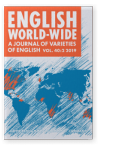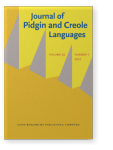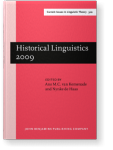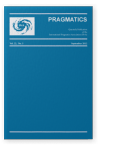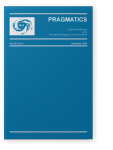Gerald Stell
List of John Benjamins publications for which Gerald Stell plays a role.
2023 Afrikaans English as a Southern Hemisphere English: Perspectives from a Namibian bilingual dataset English World-Wide 44:1, pp. 1–33 | Article
Afrikaans English is seen as connected to White South African English (WSAfE), a Southern Hemisphere English. What makes Afrikaans-speakers’ English varieties distinctly WSAfE or distinctly Afrikaans in a context that has seen much convergence between English and Afrikaans? To answer this… read more
2021 Chapter 2. English in Namibia: A socio-historical account The Dynamics of English in Namibia: Perspectives on an emerging variety, Schröder, Anne (ed.), pp. 21–42 | Chapter
This chapter provides a socio-historical account of the English language in Namibia from early colonial times to the present. Although its current dominant status in Namibia may at first sight appear historically incongruous, English was locally acknowledged as a prestige language along with… read more
2019 Tracing emergent multilectal styles: Forms and functions of code-switching among Ovambos in urban Namibia Pragmatics 29:3, pp. 436–462 | Article
This study addresses the question of how focused code-switching practices can become. It takes two complementary approaches to determine sorts and degrees of focusing, namely, a sequential analyst perspective, and a holistic perspective involving general sociolinguistic data and member’s… read more
2019 Intergroup dynamics and variation in postcolonial ESL varieties: A preliminary view of Namibian English vowel systems English World-Wide 40:2, pp. 144–169 | Article
L1 background is often described as the main factor accounting for variation in postcolonial ESL varieties. However, recent studies (e.g. Mesthrie 2009, 2017) suggest that variation patterns in ESL varieties can in some cases also be linked to identity factors rooted in local patterns of… read more
2017 Social mobility as a factor in restructuring: Black Cape Dutch in perspective Journal of Pidgin and Creole Languages 32:1, pp. 104–137 | Article
Despite regular objections, creole research tends to regard Europeans-to-non-Europeans ratios in colonial settings as a decisive factor in degrees of restructuring. As a result, relatively high proportions of Europeans are seen as the explanation for the emergence of partially restructured… read more
2012 Ethnicity as an independent factor of language variation across space: Trends in morphosyntactic patterns in spoken Afrikaans Historical Linguistics 2009: Selected papers from the 19th International Conference on Historical Linguistics, Nijmegen, 10-14 August 2009, Kemenade, Ans M.C. van and Nynke de Haas (eds.), pp. 231–252 | Article
Social class and its affiliated indicators such as geographical mobility and strength of network ties have been treated as prominent, if not overarching variables in sociolinguistic research on spatial diffusion of linguistic features. There are nonetheless grounds, in the light of linguistic data… read more
2012 Ethnicity and codeswitching: Ethnic differences in grammatical and pragmatic patterns of codeswitching in the free state Pragmatics 22:3, pp. 477–499 | Article
This article aims to compare three distinct grammatical and conversational patterns of code-switching, which it tentatively links to three different South African ethnoracial labels: White, Coloured and Black. It forms a continuation of a previous article in which correlations were established… read more
2010 Ethnicity in linguistic variation: White and coloured identities in Afrikaans-English code-switching Pragmatics 20:3, pp. 425–447 | Article
The Afrikaans speech community is characterized by a long-standing rift between Whites and Coloureds, and is for a large part bilingual, with English being increasingly integrated in its stylistic repertoire. Yet, the history of English is different across the White/Coloured divide, as in… read more
